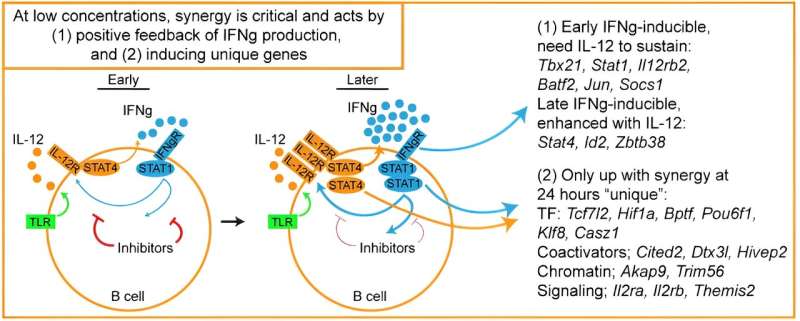This article has been reviewed according to Science X's editorial process and policies. Editors have highlighted the following attributes while ensuring the content's credibility:
fact-checked
peer-reviewed publication
trusted source
proofread
Switching decisions: Interleukin-12 influences B cell immune response

B cells are known to generate antibodies through two different responses—an "emergency response" and an "everything is okay, let's prepare for the future response," says Mark Shlomchik, UPMC Professor and Distinguished Professor of Immunology, University of Pittsburgh School of Medicine.
However, the biological mechanisms coordinating these responses have remained a mystery for decades—until now. In a study published on June 11 in Nature Immunology, Shlomchik and Rebecca Elsner, first author and research assistant professor in Shlomchik's lab, share their discovery that a cytokine called interleukin-12 (IL-12) acts like a switch to direct which antibody response B cells will generate.
Both B-cell responses are biologically important because each has a different goal. The "emergency response" (extrafollicular response) is the body's immediate reaction to an infection, in which B cells generate an abundance of antibodies to try and gain control over the infection.
In contrast, the "everything is okay response" (germinal center) is the body's acknowledgment of an under-control infection where it creates a memory of the offending pathogen through memory B cells and pathogen-specific antibodies. That memory will protect the body from any subsequent infection.
Understanding what activates each response would enable investigators to design vaccines to elicit a desired immune reaction. For example, in the case of a severe infection, providing a vaccine that activates the extrafollicular response could help a patient survive. If long-term pathogen memory is needed, the vaccine would be designed to induce a germinal center response. However, this control requires knowledge of what makes these processes occur at the biological level.
"You can't drive a car until you know the controls and how those controls work," says Shlomchik.
After finding that IL-12 played a role in inhibiting germinal center response via T cells, their recent discovery shows that IL-12 also works to push B cells toward an extrafollicular response. Directed by high IL-12 levels, B cells produce interferon gamma and more IL-12 to create an autocrine positive feedback loop that locks in the extrafollicular response decision.
"This IL-12 switch allows us to understand how to control these two types of immune responses to our benefit," says Elsner.
In addition to response-type control, this IL-12 switch may also help investigators understand when and why immune responses go awry. By learning how to control the switch, researchers can potentially fine-tune the extrafollicular response when vaccines do not work as intended. Additionally, the ability to turn down the extrafollicular response by switching off IL-12 could provide a novel approach to treating autoimmune diseases.
More information: Rebecca A. Elsner et al, IL-12 induces a B cell-intrinsic IL-12/IFNγ feed-forward loop promoting extrafollicular B cell responses, Nature Immunology (2024). DOI: 10.1038/s41590-024-01858-1


















